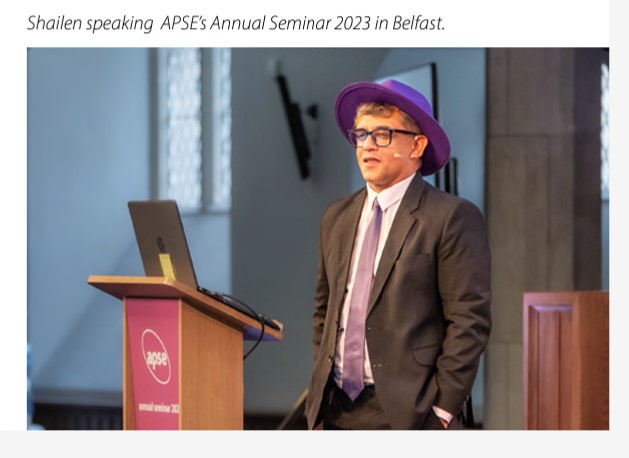Shailen Popat

I was delighted to be invited to attend and speak at the APSE annual seminar in Belfast in September 2023. For us at the Department of Public Administration and Policy, connections with elected members and council officers are an integral part of our research and teaching, so I had no hesitation about accepting the invite and being with you.
I took the opportunity in my talk to share some questions I’ve been asking myself. The first is: do you feel that your education prepared you for a role in public management?
This is an important starting point for those of us who plan continuing professional development (CPD) for others. There is no shortage of master’s degrees and CPD courses, but we must continuously consider their pertinence and relevance. Sometimes educational courses are good learning experiences that are worth having for that reason alone, however we must reflect on whether a good learning experience is also useful in the field.
Since 2008, the public service mantra has been to ‘do more with less’. As we all know this places burdens on organisations and their staff. Having to do more with less often entails operating across multiple roles and skill sets, requiring a lot of flexibility. For example, a local authority may decide that it is more efficient to have one person covering multiple roles, whereas previously, there may have been two. This can compel public service workers to try and act as experts in areas where they are not. Similarly, elected members often have to make decisions on matters that they are not experts in, whilst engaging with those who are.
Both officers and elected members need to be able to assimilate, synthesise and communicate the rationale behind policy positions and decisions that they are not experts in. This not only poses a challenge for them but also for those who support their training. We must ask ourselves, what skills do we need to train non-experts in? And how do we train them?
A further complication is that the culture, norms, and political boundaries of an organisation may not be flexible. Even though an employee may have to work and think flexibly, the structures they operate in may be very rigid. Trainers need to consider whether they are educating people with this need for flexibility in mind.
Neuroscience tells us that learning occurs incrementally – the brain’s neural networks are constantly being revised and refined as we repeat actions. The science tells us that experience matters. However, an important part of experience is making mistakes.
Therein lies the problem, for elected members and senior executives, mistakes are a luxury that they cannot afford and are unlikely to be tolerated. This puts us in another quandary: we know that learning requires mistakes, and therefore we have to train practitioners and decision-makers to be reflective, however, if decision-makers fear making mistakes, this will hinder their learning.
I also wonder whether this fear of making mistakes stops us from challenging ourselves to think, decide, and act differently from the norm. How much do our cultures and structures empower public service workers and elected members to be genuinely innovative? A lot of our learning occurs when we are exposed to new materials that challenge our previous beliefs and understandings.
There is also a concept called disfluency which means that not only should we learn something new but when we use and explain it to others, it begins to become clearer as to how we could enact it ourselves. ‘How much do we practice dysfluency and how can we educate for it?’ I would welcome anyone who would like to continue the discussion to email me.
Shailen Popat is Director of the INLOGOV full-time MSc in Public Management. In 2022, he was awarded the accolade of the University outstanding Teacher of the Year, and in 2023 was awarded a Senior Fellowship of the Higher Education Academy. He can be contacted via email at: [email protected]
This article was first published in the Association for Public Service Excellence (APSE) newsletter, Winter 2024